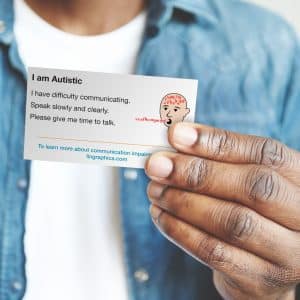The ability to communicate helps individuals engage with the world around them. From saying goodnight to a loved one to asking a doctor for help, it’s how we exchange information. When certain conditions or impairments affect things like speech and language, communication can become less effective. When communication falls short, the harsh reality is that one’s health and safety can be at risk.
Karen Garner is a 73-year-old with dementia and aphasia who was arrested last summer after walking out of a Colorado Walmart without paying for some items. Recently released body-camera footage of the arrest shows the confused and frightened woman pleading with police, who wrestle her to the ground.
According to her family, her arm was broken and shoulder was dislocated during the violent arrest. She was transported from the scene and handcuffed in a booking cell, where she sat without treatment hours after the incident. Following public outcry, the city of Loveland announced it would begin an investigation into the woman’s treatment.
Incidents of aggression between those with speech and/or language impairments and police are unfortunately not unheard of. As the larger conversation of police brutality takes place throughout the United States, we encourage individuals with conditions like aphasia, dementia, brain injury, as well as autistic people, to involve themselves in the larger conversation, while also taking steps to evaluate and increase individual safety.
Identification Cards For Encounters With Law Enforcement
An identification card — one that says who you are, what your condition is, and what that means — can be a helpful tool in many day-to-day interactions. It can also provide much-needed context to law enforcement.

Create your own custom communication ID card. Simply choose the condition that best describes your impairment, and enter important information like your name and emergency contact. Downloading a custom communication ID card from Lingraphica is always free. Follow the download link to begin.
Customizing Your AAC Device For Encounters With Law Enforcement
For AAC device users, having specific prompts and replies for emergency situations can be helpful to quickly communicate needs. These keywords and phrases can also include important information during encounters with police. A good foundation would be prompts that say who you are, what your condition is, and what that means. If you have certain unique needs, you can customize to accommodate those.
For example, with the press of a button, your device could read out loud, “I do not like to be touched. I may react in an unexpected way.” If you have an Lingraphica device and would like a reminder on how to create and customize icons, schedule a free training session with our team.
Communication helps connect us to the world that surrounds us — the good and the bad. Do you have any strategies to reduce risk? Share in the comments below.

Lingraphica Can Help
We offer free one-on-one consultations to SLPs, caregivers, and people with aphasia who want to improve communication, but aren’t sure where to start. Call us now at 888-965-6005 or schedule a call.









